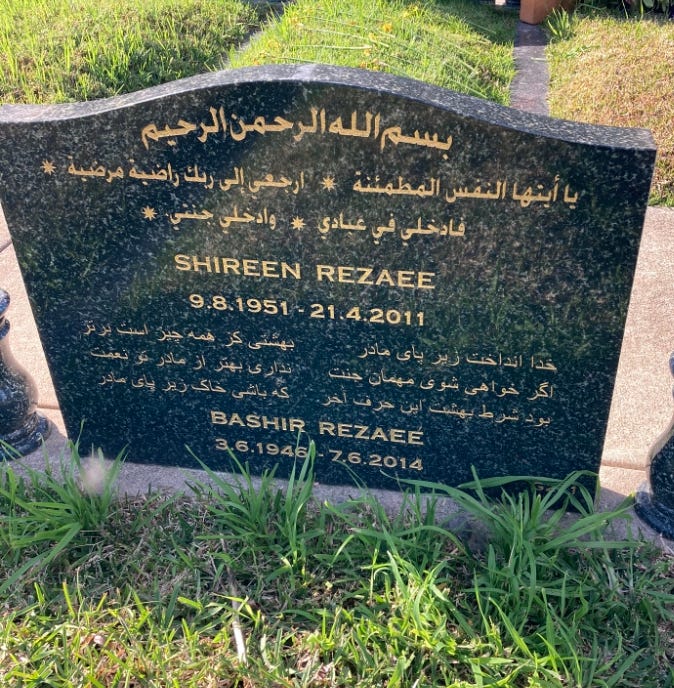I have always felt oddly at home in a cemetery. There you cannot escape your fuddled emotions and thoughts. They confront you when you stand before the grave of a dearly departed, forcing you to reflect. Worldly struggles are reduced to insignificance, the fallouts and fights with friends fizzle out, and your soul’s compass reorients itself toward a higher purpose.
There silence reigns supreme. And the silence is beautiful, and sorrowful.
The cemetery’s silence is occasionally punctured by tears. By prayers. By mourners beseeching the dead to respond to their forlorn cries. Most of the time their cries are met with a stiff silence.
But sometimes the dead respond.
On September 10th 2020, I visited Rookwood Cemetery for the first time since my yearlong sojourn in Iran. A close childhood friend of mine had tragically passed away when I was overseas, and I wanted to visit his grave and recite a prayer for him.
Before reaching his grave I took the opportunity — as was my habit — to wander through the cemetery. I would visit the graves of other loved ones, peer at names and dates on random tombstones, and pray for their salvation, one and all. A stroll through the neighbourhood of the dead. Of all the tombstones I came across, one of them, belonging to Shireen and Bashir Rezaee, caught my eye.
I noticed that the tombstone was adorned with lines of Persian poetry. Having just learnt Persian, I was excited to decipher what the words were. The translation is as follows:
God has placed a Heaven greater than all things beneath the feet of the mother, If you desire to be a guest of this Heaven Then you have no greater blessing than your mother The condition of entering heaven is this final statement: That you be the dust beneath the feet of your mother
The words sent a jolt through me. Here I was, standing before a mother I had never known, thinking about all the mothers I had ever known. Were they truly appreciated and loved during their own life? How did Shireen’s children remember her? Did they still visit often? What of my own mother? Have I fallen short in how I treat her? I was not able to answer these questions, and continued onto the next grave. But I was not able to forget them either, as they continued to dance around in my head while I wandered through the neighbourhood of the dead.
When I reflect on this visit to the cemetery, nearly four years on, I cannot help but feel grateful. The dead — through some lines of Persian poetry — responded to questions that I had not posed — questions that I still think about today. Now when I visit the cemetery, I linger just a moment longer whenever I pass by tombstones, in the hope that once again the dead will respond. Such a desire to converse or relate to the dead is nothing new; Shaykh Nizami, a great Persian poet, eloquently wrote:
A lively soul abandoned the company of the sombre, for the neighbourhood of the dead Reading the message of impermanence on every grave, Seeking the spirit of immortality from every pious soul. A curious veteran asked him, as he passed by, 'Why run from the living to take lodgings with the dead?' He said, 'The vicious abound in the town, While the pure-minded lie buried beneath the ground. People dead at heart abound in this land, What's the use of keeping company of the dead? The company of the dead is deadening, And the society of the sombre is sad, The dead scattered under the ground, Though dead in body are live in soul, Dead in heart I was, bound by worldly chores, Their chaste looks have revived me, their dust is the elixir of life. (Translated by Ali Quli Qar'ai
If you’ve reached the end of this reflection, then please recite a prayer for Shireen and Bashir Rezaee, and for all of our mothers.






A powerful reflection Dr Ali. I envy your experience. It is one, that has immortalised your relationship with cemetery’s.
For when you first entered Rookwood you were a stranger of the cemetery, and through your engagement, you have become a student of death. How bitter is reality, where traversing beyond the journey of this life has a soothing effect.
This reflection reminded me of a recent ceremony I attended for a Martyr in the South of Lebanon. His was killed as a result of an Israeli drone strike. Unfortunately, he left 3 beautiful children and a pregnant wife. “The dead are alive” - this feeling had overcame me as his martyrdom was celebrated. Rather than be saddened, his family were proud - standing firm in his sacrifice. Through the thousands of people alive at this ceremony - he had become a “teacher of life”.
Interesting isn’t it, as you graduate from being a “student of death”, you ironically become a “teacher of life”.
Holy smokes what a line! "Here I was, standing before a mother I had never known, thinking about all the mothers I had ever known." 🔥🔥🔥
Back to the post...